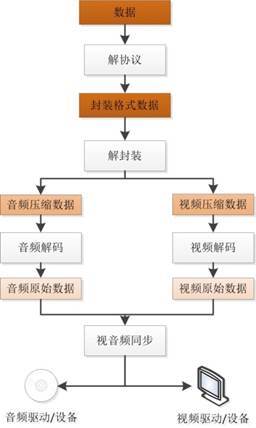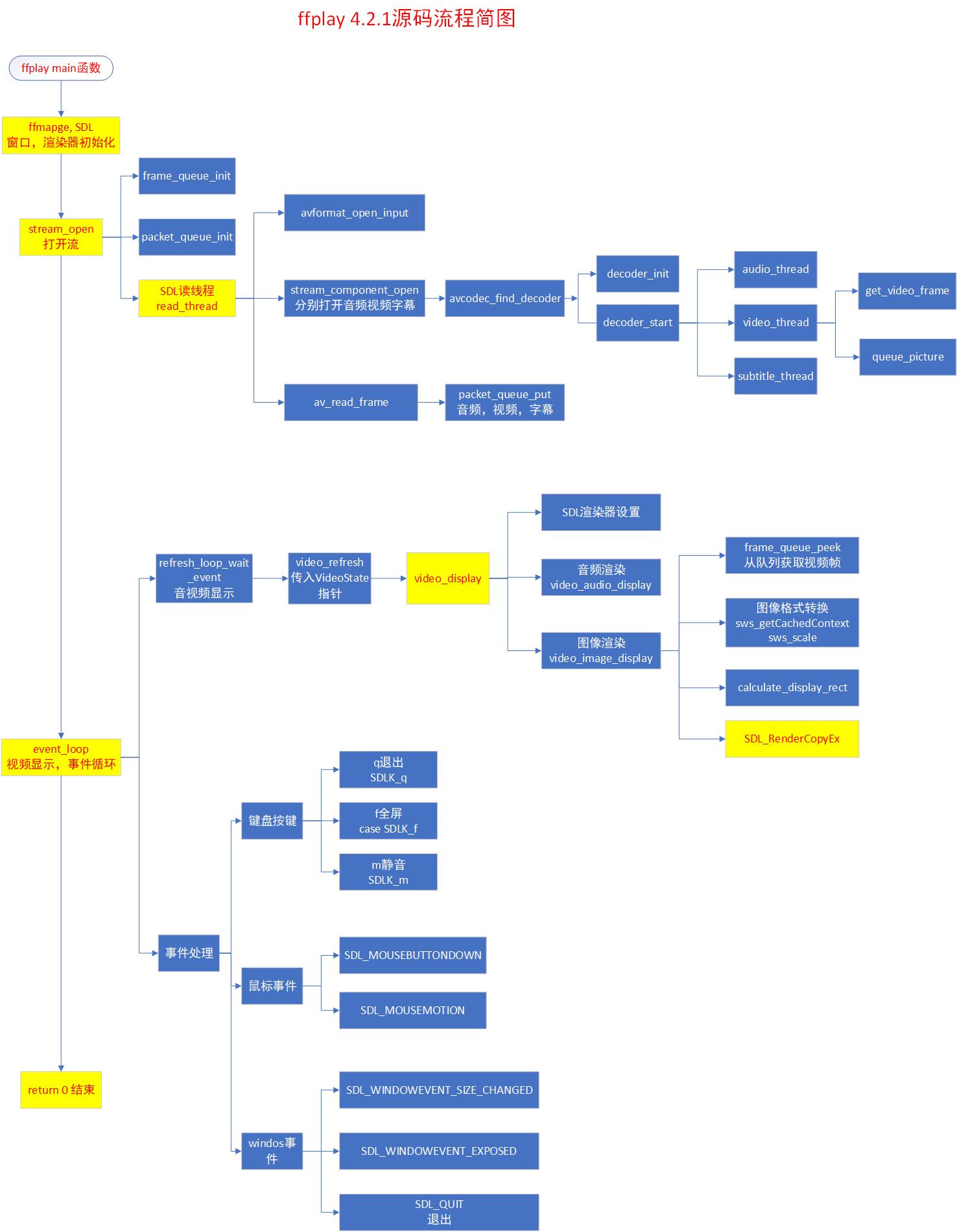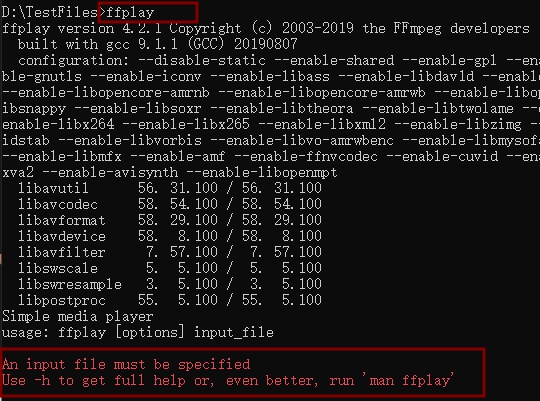/* Minimum SDL audio buffer size, in samples. */ // Minimum audio buffer #define SDL_AUDIO_MIN_BUFFER_SIZE 512 /* Calculate actual buffer size keeping in mind not cause too frequent audio callbacks */ // To calculate the actual audio buffer size, you do not need to call back too often. The maximum number of audio calls set here is 30 times per second #define SDL_AUDIO_MAX_CALLBACKS_PER_SEC 30 /* Step size for volume control in dB */ // Audio control steps in db #define SDL_VOLUME_STEP (0.75) /* no AV sync correction is done if below the minimum AV sync threshold */ // Minimum synchronization threshold below which synchronization correction is not required #define AV_SYNC_THRESHOLD_MIN 0.04 /* AV sync correction is done if above the maximum AV sync threshold */ // Maximum synchronization threshold, if greater than this value, synchronization correction is required #define AV_SYNC_THRESHOLD_MAX 0.1 /* If a frame duration is longer than this, it will not be duplicated to compensate AV sync */ // Frame compensation synchronization threshold, if the frame duration is longer than this, it is not used to compensate synchronization #define AV_SYNC_FRAMEDUP_THRESHOLD 0.1 /* no AV correction is done if too big error */ // Synchronization threshold. If the error is too large, no correction will be made #define AV_NOSYNC_THRESHOLD 10.0 /* maximum audio speed change to get correct sync */ // Maximum audio speed change (percent) for correct synchronization #define SAMPLE_CORRECTION_PERCENT_MAX 10 /* external clock speed adjustment constants for realtime sources based on buffer fullness */ // Adjust the external clock according to the buffer filling time of the real-time bitstream // minimum value #define EXTERNAL_CLOCK_SPEED_MIN 0.900 // Maximum value #define EXTERNAL_CLOCK_SPEED_MAX 1.010 // Stepping #define EXTERNAL_CLOCK_SPEED_STEP 0.001 /* we use about AUDIO_DIFF_AVG_NB A-V differences to make the average */ // Use difference to average #define AUDIO_DIFF_AVG_NB 20 /* polls for possible required screen refresh at least this often, should be less than 1/fps */ // Refresh rate should be less than 1/fps #define REFRESH_RATE 0.01 /* NOTE: the size must be big enough to compensate the hardware audio buffersize size */ /* TODO: We assume that a decoded and resampled frame fits into this buffer */ // Sampling size #define SAMPLE_ARRAY_SIZE (8 * 65536) #define CURSOR_HIDE_DELAY 1000000 #define USE_ONEPASS_SUBTITLE_RENDER 1 // Sampling mark static unsigned sws_flags = SWS_BICUBIC; // Package list structure typedef struct MyAVPacketList { AVPacket pkt; struct MyAVPacketList *next; int serial; } MyAVPacketList; // Packet queue to be decoded typedef struct PacketQueue { MyAVPacketList *first_pkt, *last_pkt; int nb_packets; int size; int64_t duration; int abort_request; int serial; SDL_mutex *mutex; SDL_cond *cond; } PacketQueue; #define VIDEO_PICTURE_QUEUE_SIZE 3 #define SUBPICTURE_QUEUE_SIZE 16 #define SAMPLE_QUEUE_SIZE 9 #define FRAME_QUEUE_SIZE FFMAX(SAMPLE_QUEUE_SIZE, FFMAX(VIDEO_PICTURE_QUEUE_SIZE, SUBPICTURE_QUEUE_SIZE)) // Audio parameters typedef struct AudioParams { int freq; // frequency int channels; // Channels int64_t channel_layout; // Channel design, mono, dual or stereo enum AVSampleFormat fmt; // Sampling format int frame_size; // Sampling size int bytes_per_sec; // How many bytes per second } AudioParams; // Clock typedef struct Clock { double pts; // clock base*/ double pts_drift; // Update the clock difference / * clock base minus time at which we updated the clock*/ double last_updated; // Time of last update double speed; // speed int serial; // clock is based on a packet with this serial*/ int paused; // Stop sign int *queue_serial; // pointer to the current packet queue serial, used for obsolete clock detection*/ } Clock; /* Common struct for handling all types of decoded data and allocated render buffers. */ // Decode frame structure typedef struct Frame { AVFrame *frame; // Frame data AVSubtitle sub; // Subtitle int serial; // sequence double pts; // Display timestamp for the frame / * presentation timestamp for the frame*/ double duration; // Frame display time / * estimated duration of the frame*/ int64_t pos; // Position of the frame in the input file*/ int width; // Frame width int height; // Frame height int format; // format AVRational sar; // Additional parameters int uploaded; // upload int flip_v; // Reversal } Frame; // Decoded frame queue typedef struct FrameQueue { Frame queue[FRAME_QUEUE_SIZE]; // Queue array int rindex; // Read index int windex; // Write index int size; // Size int max_size; // Maximum size int keep_last; // Keep previous int rindex_shown; // Read and display SDL_mutex *mutex; // Mutually exclusive variables SDL_cond *cond; // Conditional variable PacketQueue *pktq; } FrameQueue; // Clock synchronization type enum { AV_SYNC_AUDIO_MASTER, // Audio as synchronization, audio as synchronization by default / * default choice*/ AV_SYNC_VIDEO_MASTER, // Video as sync AV_SYNC_EXTERNAL_CLOCK, // synchronize to an external clock*/ }; // Decoder structure typedef struct Decoder { AVPacket pkt; // package AVPacket pkt_temp; // Tundish PacketQueue *queue; // Packet queue AVCodecContext *avctx; // Decoding context int pkt_serial; // Packet sequence int finished; // Is it over int packet_pending; // Is there a package waiting SDL_cond *empty_queue_cond; // Empty queue condition variable int64_t start_pts; // Start timestamp AVRational start_pts_tb; // Additional parameters to start int64_t next_pts; // Next frame timestamp AVRational next_pts_tb; // Additional parameters for next frame SDL_Thread *decoder_tid; // Decoding thread } Decoder; // Video state structure typedef struct VideoState { SDL_Thread *read_tid; // Read thread AVInputFormat *iformat; // Input format int abort_request; // Request cancellation int force_refresh; // force refresh int paused; // Stop it int last_paused; // Finally stop int queue_attachments_req; // Queue attachment request int seek_req; // Lookup request int seek_flags; // Lookup flag int64_t seek_pos; // Lookup location int64_t seek_rel; // int read_pause_return; // Read stop return AVFormatContext *ic; // Decode format context int realtime; // Real time bitstream or not Clock audclk; // Audio clock Clock vidclk; // Video clock Clock extclk; // External clock FrameQueue pictq; // Video queue FrameQueue subpq; // Caption queue FrameQueue sampq; // Audio queue Decoder auddec; // Audio decoder Decoder viddec; // Video Decoder Decoder subdec; // subtitle decoder int audio_stream; // Audio stream Id int av_sync_type; // Synchronization type double audio_clock; // Audio clock int audio_clock_serial; // Audio clock sequence double audio_diff_cum; // Used for AV difference average calculation*/ double audio_diff_avg_coef; // double audio_diff_threshold; // Audio differential threshold int audio_diff_avg_count; // Average difference quantity AVStream *audio_st; // Audio bitstream PacketQueue audioq; // Audio packet queue int audio_hw_buf_size; // Hardware buffer size uint8_t *audio_buf; // Audio buffer uint8_t *audio_buf1; // Audio buffer 1 unsigned int audio_buf_size; // Audio buffer size / * in bytes*/ unsigned int audio_buf1_size; // Audio buffer size 1 int audio_buf_index; // Audio buffer index / * in bytes*/ int audio_write_buf_size; // Audio write buffer size int audio_volume; // volume int muted; // Is it mute? struct AudioParams audio_src; // Audio parameters #if CONFIG_AVFILTER struct AudioParams audio_filter_src; // Audio filter #endif struct AudioParams audio_tgt; // Audio parameters struct SwrContext *swr_ctx; // Audio transcoding context int frame_drops_early; // int frame_drops_late; // enum ShowMode { // Display type SHOW_MODE_NONE = -1, // No display SHOW_MODE_VIDEO = 0, // Display video SHOW_MODE_WAVES, // Show waves, audio SHOW_MODE_RDFT, // Adaptive filter SHOW_MODE_NB // } show_mode; int16_t sample_array[SAMPLE_ARRAY_SIZE]; // Sampling array int sample_array_index; // Sampling index int last_i_start; // From the beginning RDFTContext *rdft; // Adaptive filter context int rdft_bits; // Self use bit rate FFTSample *rdft_data; // Fast Fourier sampling int xpos; // double last_vis_time; // SDL_Texture *vis_texture; // Audio Texture SDL_Texture *sub_texture; // Subtitle SDL_Texture *vid_texture; // Video Texture int subtitle_stream; // Subtitle bitstream Id AVStream *subtitle_st; // Subtitle code stream PacketQueue subtitleq; // Subtitle package queue double frame_timer; // Frame timer double frame_last_returned_time; // Last return time double frame_last_filter_delay; // Last filter delay int video_stream; // Video stream Id AVStream *video_st; // video stream PacketQueue videoq; // Video packet queue double max_frame_duration; // Maximum duration of a frame - about this, we consider the jump a timestamp continuity struct SwsContext *img_convert_ctx; // Video transcoding context struct SwsContext *sub_convert_ctx; // Subtitle transcoding context int eof; // End sign char *filename; // file name int width, height, xleft, ytop; // Width and height, actually coordinates int step; // Stepping #if CONFIG_AVFILTER int vfilter_idx; // Filter index AVFilterContext *in_video_filter; // First filter in the video chain AVFilterContext *out_video_filter; // the last filter in the video chain AVFilterContext *in_audio_filter; // First filter in the audio chain AVFilterContext *out_audio_filter; // Last filter in the audio chain AVFilterGraph *agraph; // audio filter graph #endif // Last video stream Id, last audio stream Id, last subtitle stream Id int last_video_stream, last_audio_stream, last_subtitle_stream; SDL_cond *continue_read_thread; // Continuous read thread } VideoState; /* options specified by the user */ static AVInputFormat *file_iformat; // File input format static const char *input_filename; // Enter file name static const char *window_title; // Title static int default_width = 640; // Default width static int default_height = 480; // Default height static int screen_width = 0; // Screen width static int screen_height = 0; // Screen height static int audio_disable; // Do you want to disable playing sound static int video_disable; // Disable video static int subtitle_disable; // Do you want to disable subtitles static const char* wanted_stream_spec[AVMEDIA_TYPE_NB] = {0}; static int seek_by_bytes = -1; // static int display_disable; // Display prohibited static int borderless; // static int startup_volume = 100; // Initial volume static int show_status = 1; // Display state static int av_sync_type = AV_SYNC_AUDIO_MASTER; // Synchronization type static int64_t start_time = AV_NOPTS_VALUE; // start time static int64_t duration = AV_NOPTS_VALUE; // interval static int fast = 0; // fast static int genpts = 0; // static int lowres = 0; // Slow speed static int decoder_reorder_pts = -1; // Decoder rearranges timestamps static int autoexit; // No auto exit static int exit_on_keydown; // Press to exit static int exit_on_mousedown; // Whether to press the mouse to exit static int loop = 1; // loop static int framedrop = -1; // Abandon frames static int infinite_buffer = -1; // Infinite buffer static enum ShowMode show_mode = SHOW_MODE_NONE; // Display type static const char *audio_codec_name; // Audio decoder name static const char *subtitle_codec_name; // Subtitle decoder name static const char *video_codec_name; // Video decoder name double rdftspeed = 0.02; // Speed of adaptive filter static int64_t cursor_last_shown; // Last display cursor static int cursor_hidden = 0; // Cursor hiding #if CONFIG_AVFILTER static const char **vfilters_list = NULL; // Video Effects static int nb_vfilters = 0; // Number of video filters static char *afilters = NULL; // Audio Filters #endif static int autorotate = 1; // Auto rotate or not /* current context */ static int is_full_screen; // Full screen static int64_t audio_callback_time; // Audio callback time static AVPacket flush_pkt; // Refreshed package #define FF_QUIT_EVENT (SDL_USEREVENT + 2) static SDL_Window *window; // window static SDL_Renderer *renderer; // Renderer
Ffplay is a player implemented by ffmpeg code. It can play local files or network resources, similar to vlc player. After the ffmpeg environment is configured, open the console and input ffplay [resource name] in the directory where the resource is located to play the media resource. The source code of ffplay is only 3800 lines. Project C is the SDL library used for audio and video display and rendering. After downloading the ffmpeg source code, find ffplay.c, which is the whole code of the ffplay player. I use the source code of ffmpeg version 4.2.1. The main points are as follows: analyze the source code of ffplay. If you are interested, you can have a look. If there is something wrong, please point out. I will reply in time.
ffplay source code analysis (1): code architecture
ffplay source code analysis (2): exploring custom queues
ffplay source code analysis (3): read'thread
Ffplay source code analysis (4): ffplay decoding thread analysis
Ffplay source code analysis (5): ffplay video display thread analysis
Ffplay source code analysis (6): ffplay audio output thread analysis
Ffplay source code analysis (7): ffplay subtitle display thread analysis
ffplay source code analysis (8): audio and video synchronization -- Foundation
Source code analysis of ffplay (9): video synchronous audio
ffplay source code analysis (10): audio synchronous video
ffplay source code analysis (11): synchronization to external clock
In the broadcast of video files, it generally involves file reading, unpacking, decoding, audio-video output, audio-video synchronization and other technologies. The complete flow chart is as follows:

In this process, there are several threads:
(1) Read thread. Read files, unpack
(2) Audio decoding thread. Decode audio compressed data as PCM data.
(3) Video decoding thread. Decode the compressed video data as image data.
(4) Audio output thread. Based on SDL playback, this thread is actually an internal thread of SDL.
(5) Video output thread. Based on SDL playback, this thread is the main thread of the program.
Due to the existence of multiple threads, multi thread safe queues are used for data transmission between threads, including FrameQueue and PacketQueue. The process of independent output of audio and video will inevitably lead to the asynchronous phenomenon of audio and video, so there will be some control strategies to ensure the synchronous output of audio and video before output. After code analysis, I drew a sketch as follows:

You need the original picture, you can Download here.
ffplay main function code is as follows
At initialization, create SDL After windows and renderers are completed, access the stream_open Function. In this function, resources are unpacked, decoded, data frame to column operation, color space conversion, etc., which are carried out in the sub thread of the main thread event_loop Can handle video display, keyboard keys, mouse and other events. Then the mechanism of synchronization and mutual exclusion is used to realize the synchronous playback of audio and video.
main The function is preceded by ffmpeg, SDL Initialization and related information settings, for example, when we use ffplay When playing a file, if no name is entered in the console, an error will be reported as follows:
The error is as follows:
ffplay The code is still very difficult. This is a complete player design, involving a lot of content, not only the code, but also some knowledge of audio and video. For example, how to design the data frame queue? How to ensure the synchronization of the reading and writing of the queue when multithreading? How to ensure the best performance? After all, the performance of audio and video codec and playback is very important. It is not possible for a file to be played, such as frame loss, carton, etc. all of these are in the code. Many blogs have been consulted, and there are many researches indeed ffmpeg Later, I will reprint them for later analysis and study. Friends who are interested can also have a look. If there is something wrong, please point out it and I will update it in time.
ffplay The source code can be directly compiled from the project. You can see how I compiled it: VS2019 Compile ffplay Source code
<li class="tool-item tool-active is-like "><a href="javascript:;"><svg class="icon" aria-hidden="true"> <use xlink:href="#csdnc-thumbsup"></use> </svg><span class="name">Give the thumbs-up</span> <span class="count"></span> </a></li> <li class="tool-item tool-active is-collection "><a href="javascript:;" data-report-click="{"mod":"popu_824"}"><svg class="icon" aria-hidden="true"> <use xlink:href="#icon-csdnc-Collection-G"></use> </svg><span class="name">Collection</span></a></li> <li class="tool-item tool-active is-share"><a href="javascript:;" data-report-click="{"mod":"1582594662_002"}"><svg class="icon" aria-hidden="true"> <use xlink:href="#icon-csdnc-fenxiang"></use> </svg>share</a></li> <!--Reward begins--> <!--End of reward--> <li class="tool-item tool-more"> <a> <svg t="1575545411852" class="icon" viewBox="0 0 1024 1024" version="1.1" xmlns="http://www.w3.org/2000/svg" p-id="5717" xmlns:xlink="http://www.w3.org/1999/xlink" width="200" height="200"><defs><style type="text/css"></style></defs><path d="M179.176 499.222m-113.245 0a113.245 113.245 0 1 0 226.49 0 113.245 113.245 0 1 0-226.49 0Z" p-id="5718"></path><path d="M509.684 499.222m-113.245 0a113.245 113.245 0 1 0 226.49 0 113.245 113.245 0 1 0-226.49 0Z" p-id="5719"></path><path d="M846.175 499.222m-113.245 0a113.245 113.245 0 1 0 226.49 0 113.245 113.245 0 1 0-226.49 0Z" p-id="5720"></path></svg> </a> <ul class="more-box"> <li class="item"><a class="article-report">Article report</a></li> </ul> </li> </ul> </div> </div> <div class="person-messagebox"> <div class="left-message"><a href="https://blog.csdn.net/yao_hou"> <img src="https://profile.csdnimg.cn/E/C/8/3_yao_hou" class="avatar_pic" username="yao_hou"> <img src="https://g.csdnimg.cn/static/user-reg-year/1x/4.png" class="user-years"> </a></div> <div class="middle-message"> <div class="title"><span class="tit"><a href="https://Blog.csdn.net/yao'ou "data report Click =" {& quot; mod & quot;: & quot; popu & quot;} "target =" ﹐ blank "> leader of Linghu</a></span> </div> <div class="text"><span>188 original articles published</span> · <span>Praise 90</span> · <span>180000 visitors+</span></div> </div> <div class="right-message"> <a href="https://Im. CSDN. Net / im / main. HTML? Username = Yao [Hou "target =" _blank "class =" BTN BTN SM BTN red hole BT button personal letter "> private message </a> <a class="btn btn-sm bt-button personal-watch" data-report-click="{"mod":"popu_379"}">follow</a> </div> </div> </div>


